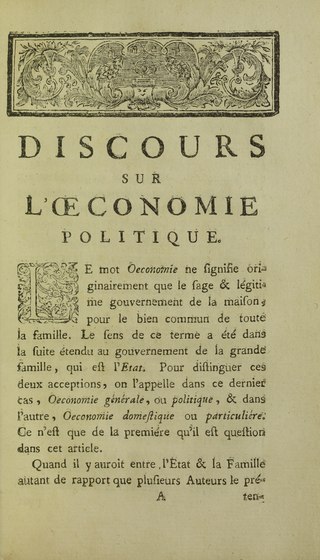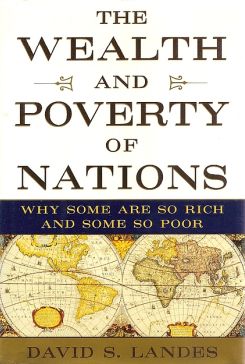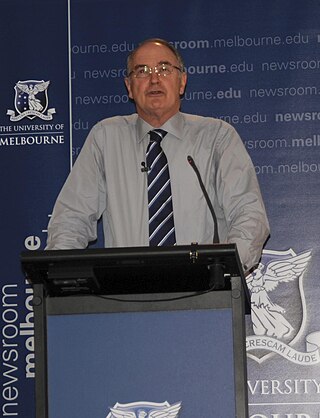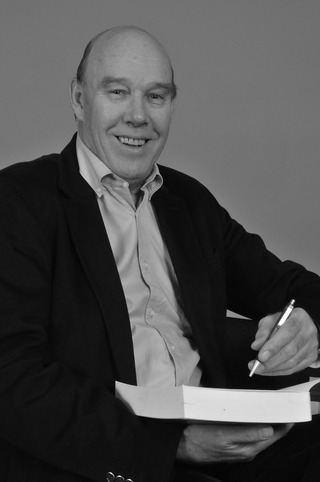
Economic history is the study of history using methodological tools from economics or with a special attention to economic phenomena. Research is conducted using a combination of historical methods, statistical methods and the application of economic theory to historical situations and institutions. The field can encompass a wide variety of topics, including equality, finance, technology, labour, and business. It emphasizes historicizing the economy itself, analyzing it as a dynamic entity and attempting to provide insights into the way it is structured and conceived.

Political economy is a branch of political science and economics studying economic systems and their governance by political systems. Widely studied phenomena within the discipline are systems such as labour markets and financial markets, as well as phenomena such as growth, distribution, inequality, and trade, and how these are shaped by institutions, laws, and government policy. Originating in the 16th century, it is the precursor to the modern discipline of economics. Political economy in its modern form is considered an interdisciplinary field, drawing on theory from both political science and modern economics.

Industrialisation is the period of social and economic change that transforms a human group from an agrarian society into an industrial society. This involves an extensive reorganisation of an economy for the purpose of manufacturing. Industrialization is associated with increase of polluting industries heavily dependent on fossil fuels. With the increasing focus on sustainable development and green industrial policy practices, industrialization increasingly includes technological leapfrogging, with direct investment in more advanced, cleaner technologies.
Andre Gunder Frank was a German-American sociologist and economic historian who promoted dependency theory after 1970 and world-systems theory after 1984. He employed some Marxian concepts on political economy, but rejected Marx's stages of history, and economic history generally.

Jomo Kwame Sundaram, fondly known just as Jomo, is a prominent Malaysian economist. He is a senior adviser at the Khazanah Research Institute, visiting fellow at the Initiative for Policy Dialogue, Columbia University, and an adjunct professor at the International Islamic University (IIUM).

The Wealth and Poverty of Nations: Why Some are So Rich and Some So Poor is a 1998 book by historian and economist David Landes (1924–2013). He attempted to explain why some countries and regions experienced near miraculous periods of explosive growth while the rest of the world stagnated. The book compared the long-term economic histories of different regions, specifically Europe, United States, Japan, China, the Arab world, and Latin America. In addition to analyzing economic and cliometric figures, he credited intangible assets, such as culture and enterprise, to explain economic success or failure.
The European Miracle: Environments, Economies and Geopolitics in the History of Europe and Asia is a book written by Eric Jones in 1981 to refer to the sudden rise of Europe during the late Middle Ages. Ahead of the Islamic and Chinese civilizations, Europe steadily rose since the Early modern period to a complete domination of world trade and politics that remained unchallenged until the early 20th century.
David Raymond Morgan is an Australian businessman. He was respectively managing director, executive chairman and chairman of J.C. Flowers & Co. in charge of Europe and Asia Pacific 2009 to 2016. He also served on the firm's Management Committee. He was also a chairman of J.C. Flowers (Australia) Pty Limited and a global operating partner of JC Flowers & Co. LLC.
Dr Kent Deng, FRHistS, is full professor in Economic History at the London School of Economics. He is a member of the Asian Research Centre and has been Secretary of the History and Economic Development Group UK since 2000.

Helen Dolly Hughes was an Australian economist. She was Professor Emerita at the Australian National University, Canberra, and Senior Fellow at the Centre for Independent Studies, Sydney. Hughes has been described as Australia's greatest female economist.

Joel Mokyr is a Netherlands-born American-Israeli economic historian. He is a professor of economics and history at Northwestern University, where he has taught since 1974; in 1994 he was named the Robert H. Strotz Professor of Arts and Sciences. He is also a Sackler Professorial Fellow at the University of Tel Aviv's Eitan Berglas School of Economics.

Ross Gregory Garnaut is an Australian economist, currently serving as a vice-chancellor's fellow and professorial fellow of economics at the University of Melbourne. He is the author of numerous publications in scholarly journals on international economics, public finance and economic development, particularly in relation to East Asia and the Southwest Pacific.

Şevket Pamuk is chair of contemporary Turkish studies at the European Institute, London School of Economics and Political Science, and Professor of Economics and Economic History at Boğaziçi (Bosphorus) University.
Heinz Wolfgang Arndt was a German-born Australian economist.

Anthony Philip Thirlwall is Professor of Applied Economics at the University of Kent. He has made major contributions to regional economics; the analysis of unemployment and inflation; balance of payments theory, and to growth and development economics with particular reference to developing countries. He is the author of the bestselling textbook Economics of Development: Theory and Evidence now in its ninth edition. He is also the biographer and literary executor of the famous Cambridge economist Nicholas Kaldor. Perhaps his most notable contribution has been to show that if long-run balance of payments equilibrium is a requirement for a country, its growth of national income can be approximated by the ratio of the growth of exports to the income elasticity of demand for imports.
Franklin "Frank" J.B. Stilwell is an Australian political economist and Professor Emeritus. He is known for establishing, with Evan Jones, Gavan Butler, Margaret Power, Debesh Bhattacharya, Geelum Simpson-Lee and Ted Wheelwright, an independent political economy department at the University of Sydney. His research interests include theories of political economy, inequality, urbanization, and regional development, Australian economic policy and the nature of work. His textbooks on the subject are standard teaching material for all university students in Australia studying the field of Political Economy. Stilwell's contribution to heterodox economics makes him a noteworthy figure of the Australian New Left.
Joseph Camilleri is an Australian citizen of Maltese descent. He is a social scientist and philosopher. In philosophy he mostly specialised and interested in international relations.
John Montagu Hobson, FBA is a political scientist, international relations scholar and academic. Since 2005, he has been Professor of Politics and International Relations at the University of Sheffield.
Oriental Despotism: A Comparative Study of Total Power is a book of political theory and comparative history by Karl August Wittfogel (1896–1988) published by Yale University Press in 1957. The book offers an explanation for the despotic governments in "Oriental" societies, where control of water was necessary for irrigation and flood-control. Managing these projects required large-scale bureaucracies, which dominated the economy, society, and religious life. This despotism differed from the Western experience, where power was distributed among contending groups. The book argues that this form of "hydraulic despotism" characterized ancient Egypt and Mesopotamia, Hellenistic Greece and imperial Rome, the Abbasid Caliphate, imperial China, the Moghul empire, and Incan Peru. Wittfogel further argues that 20th century Marxist-Leninist regimes, such as the Soviet Union and People's Republic of China, though they were not themselves hydraulic societies, did not break away from their historical condition and remained systems of "total power" and "total terror".
Tony Aspromourgos is an Australian historian of economic thought, professor at the University of Sydney and a Fellow of the Academy of the Social Sciences in Australia (ASSA). He has published several books and many articles in economic journals on different subjects concerning the history of economic thought, especially on William Petty, Richard Cantillon and Adam Smith.









